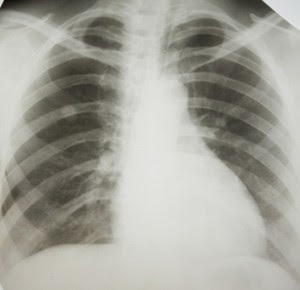Malignant mesothelioma is a rare type of cancer that occurs in the thin layer of cells lining the body's internal organs, known as the mesothelium. There are three recognized types of mesothelioma. Pleural mesothelioma is the most common form of the disease, accounting for roughly 70% of cases, and occurs in the lining of the lung known as the pleura. Peritoneal mesothelioma occurs in the lining of the abdominal cavity, known as the peritoneum and pericardial mesothelioma originates in the pericardium, which lines the heart.
An individual may be at risk to develop mesothelioma if he or she was exposed to asbestos in the workplace or at home. Mesothelioma is caused by exposure to asbestos and the inhalation of asbestos particles. In most cases, mesothelioma symptoms will not appear in an individual exposed to asbestos until many years after the exposure has occurred. Those with a past asbestos exposure history experiencing symptoms should consult a physician with experience in accurately diagnosing mesothelioma. The earlier mesothelioma is diagnosed, the more likely it is to be caught at an early stage. At earlier stages of mesothelioma progression, more treatment options are available and oftentimes a better prognosis is given. Additional mesothelioma information and statistics can be found in this section.
Mesothelioma Treatment
Once an individual has been diagnosed by a qualified mesothelioma doctor, the next step is to discuss mesothelioma treatment options and to develop a treatment plan. Recent scientific research has produced significant breakthroughs with regard to treatment protocols for mesothelioma patients and more options are now available for managing mesothelioma and supporting improved quality of life. Newly diagnosed mesothelioma patients often have many questions for their doctors about the treatment options that would be most effective for them. Conventional treatment options for mesothelioma include surgery, radiation and chemotherapy. Recently, chemotherapy drugs including Alimta® and Cisplatin have showed promising results in some patients.
Mesothelioma clinical trials as well as experimental treatments are other options that certain mesothelioma patients may be eligible to participate in. Our site features a comprehensive mesothelioma cancer treatment section that includes important information for patients and families. We've included resources on top mesothelioma experts such as Dr. Sugarbaker, as well as a comprehensive list of cancer centers where mesothelioma treatment takes place. Beyond the conventional treatments for mesothelioma, certain alternative therapies may provide assistance to mesothelioma patients. We continually update this section of our site as new mesothelioma treatment information becomes available. Check back often to read about the most recent advances.
Asbestos Exposure and Cancer
Asbestos exposure is the primary cause of mesothelioma cancer. Inhaled or ingested asbestos fibers may cause an inflammation of internal tissue and disrupt organ function which leads to the development of mesothelioma. Asbestos products were used extensively throughout the 20th century in a wide variety of applications. Asbestos companies continued to produce these products even after they were known to be hazardous and harmful to workers and their families. Many of these products were responsible for asbestos exposure sustained by both the individuals who manufactured the products as well as those who used them at commercial, industrial and military jobsites. Renovation and construction both at home and in schools and other public facilities also posed high risk areas for asbestos exposure.
Asbestos related cancer is common among military veterans who we exposed on naval ships, in shipyards and at military bases. Naval ships where exposure occurred include aircraft carriers, battleships, destroyers, submarines, warships and others. Some prominent shipyards where asbestos was prevalent include Brooklyn Navy Yard, Norfolk Navy Shipyard, Philadelphia Naval Shipyard, Long Beach Naval Shipyard and Hunters Point Naval Shipyard. At commercial and industrial locations including refineries, power plants, steel mills, auto production facilities and large construction sites, many workers were put at risk. Some of the occupations of workers at risk include electricians, plumbers, boilermakers, carpenters, mechanics , machinists and more. Additionally, if you lived with someone who was regularly exposed to asbestos and washed their clothes, you could be at risk for second hand asbestos exposure.






